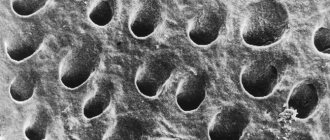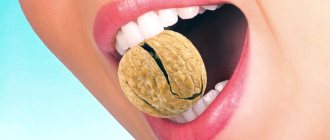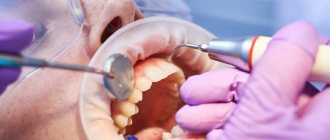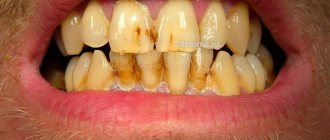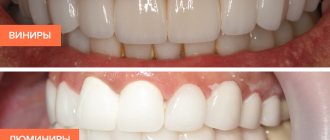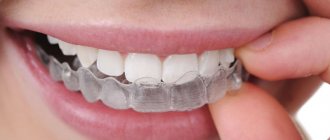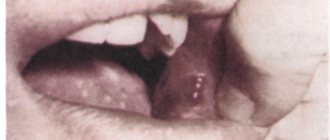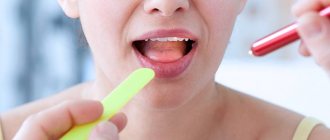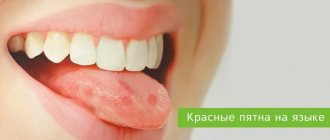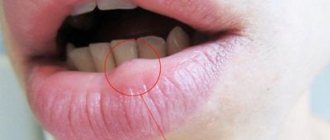Author of the article: Gadzhiev Ruslan Abasovich
Doctor-expert
Specialization: Dentist-therapist
Total work experience: since 2011
Reading time: 7-8 minutes
Tooth decay in general, and crumbling in particular, is not an aesthetic problem. In some cases, decaying teeth can be the result of not only dental, but also other types of diseases. To understand the topic and know why teeth crumble, what to do and which doctor to contact, you need to study all the important details.
Why teeth crumble - the main reasons and factors
Various types of tooth decay can be influenced by natural, mechanical and other factors. Sometimes this is a consequence of the neglect of some dental problem, and in other cases it is the result of the appearance of common diseases. Conventionally, all factors that can cause tooth decay are divided into three groups:
- External
:- Mechanical impact
. Strong clenching of the jaws, biting off hard objects, injuries - this is not a complete list of reasons that can lead to mechanical injury to the teeth. If the result is a violation of the integrity of the enamel, then the risk of not only the development of infections, but also the appearance of deformation increases. - Temperature
. The temperature of the foods you eat directly affects the condition of your teeth. Excessively hot or very cold dishes lead to the appearance of microcracks through which pathogenic bacteria penetrate, causing destruction/crumbling. - Chemical exposure
. Concentrated chemicals negatively affect the health of enamel. For example, its protective properties are significantly weakened by regular consumption of sour citrus fruits. - Improper oral hygiene
. This can be either individually incorrectly selected teeth cleaning products or irregular hygiene procedures. As a result, there is an accumulation of microbes that are destructive and will inevitably cause a number of diseases, including gums. - Domestic
:- Bad heredity
. Unfortunately, this is one of the factors that cannot be controlled. The tendency of teeth to decay, for example, due to thinned enamel, can be inherited and manifest itself at any period of a person’s life. The main task in this case is to slow down the destruction processes and focus on preventive measures. - Unbalanced diet
. In this case, a real chain reaction is triggered - the lack of a well-structured diet leads to metabolic disorders, resulting in a lack of useful vitamins and microelements necessary to strengthen the gums and enamel. As a result, for example, if teeth crumble, the reasons are a lack of fluoride and calcium and, as a consequence, thinning of dentin. - Hormonal instability
. Disruption of the endocrine system is one of the reasons for the development of caries, and its appearance is the first step towards tooth destruction. - Regular use of drugs
. Some therapeutic procedures and medications reduce the intensity of saliva production, which, accordingly, leads to negative consequences. - Chronic diseases
. Weakened immunity, for example, due to diagnosed oncology, hypertension, gastrointestinal disorders, etc. always negatively affects the condition of the teeth. - Vitamin deficiency
. To maintain healthy teeth, gums and the oral cavity in general, a person must consume sufficient quantities of vitamins B, C, E and D. Their absence in the diet or the inability to fully absorb them can lead to crumbling. - Bad habits
:- snacking on foods with excess sugar (lead to the formation of plaque, which destroys the enamel layer);
- biting third-party objects, for example, a pen/pencil, thread, wire, etc. (leads to mechanical damage);
- bruxism (night grinding of teeth leads to their abrasion and destruction);
- frequent consumption of drinks that affect enamel pigmentation (for example, coffee, red wine, carbonated drinks with artificial food colors);
- frequent whitening using folk remedies (increases sensitivity, has a detrimental effect on teeth in general);
- smoking (weakens the immune system and reduces the absorption of vitamins, which can cause vitamin deficiency).
The reason why teeth crumble may be one or several of the factors listed above. Be prepared that in order to solve the problem you will have to contact not only the dentist, but also reconsider your lifestyle, nutritional culture and oral hygiene habits.
Reasons why teeth crumble
Factors contributing to the problem include:
- advanced caries;
- fluorosis;
- erosion;
- bruxism;
- genetic predisposition;
- harmful working conditions and unfavorable environmental conditions.
Let's look at each reason in more detail.
Caries
The most common dental disease. It occurs as a result of a violation of the mineral composition of the enamel. It is believed to be caused by streptococci, which belong to the cariogenic category.
First, plaque is deposited on the enamel. Pathogenic bacteria begin to actively multiply in it. Their waste products reduce the stability of the natural dental coating . The mineral substances that protect the unit seem to dissolve. An “open” area appears. It is on top of it that a carious cavity is formed. The larger it is, the higher the risk of chipping off part of the crown.
It happens that a person does not see a carious cavity, but the teeth crumble precisely because of it. How is this possible? It's all about the disease, which occurs in the form of a chalky spot. Then only a doctor can notice that something is wrong. A person, unknowingly, faces the consequences of the disease - a destroyed fang, molar or incisor.
Fluorosis
Another reason why teeth began to become stained. It is an endemic dental disease. It is usually diagnosed in patients living in regions with high levels of fluoride in water.
Until now, the mechanism of development of this pathology has not been fully studied. Scientists suggest that at the stage of development of tooth germs, excess fluoride in the human body is converted into fluorapatite. Normally, enamel should be formed under the influence of hydroxyapatite.
Fluorapatite is very fragile. It does not withstand mechanical loads well and wears out quickly. The fact that there is a tendency to fluorosis can be understood already at the stage of changing the primary dentition to a permanent one. Then the child starts teething, covered with dark spots. Abnormal lesions are usually localized symmetrically relative to each other.
If treatment measures are not taken in time, dark spots will turn into a fragile tooth surface. Then it will no longer be possible to prevent cracking of the crown.
Erosion of teeth
Variant of non-carious lesion. When examining the patient’s oral cavity, the doctor records defective areas on the enamel and dentin, located directly on the vestibular surface of the unit.
With erosion, too, not everything is completely clear. In particular, it is not clear why they appear. Some say that they are associated with high acidity of saliva, others with genetics, and still others with serious mechanical stress. There is even a version that tooth decay due to erosion occurs due to malfunctions in the functioning of the thyroid gland (with its increased activity).
In practice, the doctor observes the following picture: matte spots form on the enamel, the patient complains of increased sensitivity of the teeth, the inability to eat spicy, sour, hot, cold. Hard tissues need to be strengthened as soon as possible. Otherwise, individual sections of the tooth will soon begin to chip off.
Bruxism
It is a violation of the chewing function of the jaw muscles . In this condition, a person's mouth muscles involuntarily contract while they sleep. As a result, opposing teeth begin to grind and rub against each other. Usually a person does not know that he suffers from bruxism until people living in the same apartment tell him about it. After all, everything happens during sleep.
Muscle crushing of the jaw is a direct path to increased abrasion of the enamel. Why they happen has not yet been established. Scientists suggest that impaired sleep function is to blame. There is a version that the problem arises in response to severe stress.
It is unlikely that it will be possible to cure bruxism completely, but this does not mean that nothing can be done. It is necessary to use special dental guards . They should be worn over your teeth while you sleep at night. This will protect the enamel and effectively prevent cracking and damage.
Genetic predisposition
It is believed that if one of the parents has crumbled teeth, then the child is highly likely to experience the problem as well. Knowing about the hereditary predisposition to dental problems, you need to pay maximum attention to oral care from childhood.
Annual examinations at the dentist's office, professional oral hygiene and regular remineralization procedures will help prevent serious damage to the enamel.
Unsatisfactory working conditions and poor environment
These are very serious problems of our time. In many hazardous industries, after several years of work, people are faced with the destruction of many teeth. No preventive measures help them, since the toxins that enter the body at the workplace turn out to be very aggressive.
The situation is similar if a person lives in an unfavorable ecological zone. Only moving can help him maintain his health.
Diagnosis and identification of the cause
Teeth crumbling is a consequence, but only a specialist can determine what the root cause is. It will take one or more appointments (depending on whether additional tests are required) to understand whether dental or some other reason led to the appearance of crumbling.
The diagnostic examination takes place in several stages:
- examination of the patient’s oral cavity to collect a detailed medical history;
- if the reason is not dental, then a recommendation is given to visit a doctor according to indications, for example, an endocrinologist, therapist, gynecologist, etc.;
- a referral is issued for blood tests (to identify possible pathologies, such as anemia, hormonal disorders, etc.).
Often, x-rays, ultrasound and other tests may be required. The more thoroughly information about your health status is collected, the higher the chance that the cause of tooth decay will be eliminated and it will be possible to save those that are not yet affected.
You might be interested in:
Online consultation
Dental restoration
Treatment of caries
Cervical caries
Crushed wisdom tooth?
Since wisdom teeth erupt with carious lesions and an unstable layer of enamel, their crumbling is a very common phenomenon. In rare cases, dentists undertake their restoration; such teeth are not subject to prosthetics. It is almost impossible to get close to them due to their inconvenient location, and the treatment will be temporary, one way or another they will crumble anyway. Most often, “eights” are subject to extraction at the first signs of crumbling. The sooner the patient addresses this problem to the dentist, the easier, faster and more painless the manipulation will be, so there is no need to be afraid of this procedure. Dentists use strong anesthetic substances to remove third molars, so the pain is reduced, but after the anesthesia wears off, the use of an anesthetic will be required, since such removal is considered “complicated” and the gums can hurt for up to seven days.
What to do with already crumbled teeth?
Whatever the reason, but if the fact of crumbling has already happened, you need to worry about the issue of restoration. Dental procedures in this case can be carried out in parallel with the elimination of the cause of teeth crumbling.
Recommended options for restoring crumbling teeth:
- Artistic restoration or filling
. Suitable for cases where a small area is crumbled and the resulting cavity is not affected by caries. Photopolymer materials are installed in place of the missing piece of fabric. - Prosthetics
.
The appropriate option is selected individually. The dentist may offer you: Veneers
. If the destruction has affected only the front part of the tooth and is purely aesthetic in nature, a ceramic onlay will help correct the defect. - Crowns
. If the tooth has crumbled very badly, then crowns made of metal-ceramics, ceramics or zirconium dioxide can be used for restoration. - Tabs
. They allow you to restore the destroyed part by replacing the missing tissue.
. It involves the implantation of an artificial root into the bone tissue, on which a crown is then installed. The method is indicated for those whose tooth could not be saved, which led to its complete loss.
Only a dentist can determine the optimal method for restoring crushed parts, and already at the first examination. Please note that if the problem is not addressed immediately, it may worsen and lead to complete tooth loss.
Professional treatments
To stop tooth decay, experts recommend strengthening the enamel with the help of remineralizing agents:
- fluoridation – periodic coating with solutions containing fluorine and other useful microelements;
- artificial saturation of the enamel surface with calcium and other minerals - the dentinal tubules are sealed and the density of the enamel increases;
- ozonation – destruction of bacteria in the affected tooth tissues without injuring soft tissues, helps stop destruction and cure caries at the initial stage;
- filling of dental defects;
- prosthetics – a decaying tooth is covered with a crown to isolate it from aggressive environments and stop crumbling.
- fissure sealing – sealing the chewing surface of molars with a special filling material;
The dentist chooses the appropriate treatment method, depending on the condition of the teeth and the age of the patient.
If your teeth have already begun to decay/crumple or the first signs of caries have appeared (stains on the enamel, changes in its color), do not delay your visit to the dentist. This is when time matters!
Prevention of tooth decay
Already knowing why teeth crumble, it’s easy to draw logical conclusions about what you should give up and what you should take up as a habit as preventive measures. But, in fact, the list of recommendations for well-organized prevention is quite large. The main tips concern the following issues:
- Professional cleaning
. It is carried out to remove plaque and stone. - Remineralization
. It is carried out with the aim of restoring and normalizing the balance of vitamins in the dental tissues. To saturate the tissues with the necessary elements, a special composition is applied to the surface of the tooth for several minutes. After enrichment with fluorine and calcium, the fabric becomes stronger. - Fluoridation
. The use of fluoride-containing pastes that actively nourish the enamel. It is fluoride that is responsible for crystalline calcium compounds and helps strengthen teeth. - Taking active supplements
. With a predominance of calcium and vitamin D. - Rejection of bad habits
. Both in nutrition and in other aspects, for example, refusing to bite your nails. - Revision of the diet
. Regular consumption of seafood, fresh vegetables, fruits and cottage cheese is encouraged. - Rinse
(with water or special compounds). Recommended after every meal and snack. - Routine visit to the dentist.
Even if you have no complaints, it is recommended to schedule an examination at least twice a year.
Also try to avoid stress and walk outdoors more often. In addition, it would be a good idea to consult with your doctor about choosing the toothpaste that is best suited for you. And also purchase a soft brush, rinsing compositions and floss for cleaning the interdental space. Their regular use will be an excellent prevention.
My baby is teething - how can I help him?
The child's profuse salivation will tell you that the first tooth is on the way. 1-2 months before the first tooth erupts, the baby’s saliva begins to flow so actively that it is already difficult to do without aprons and bibs.
All your older relatives will probably tell you about the unpleasant side effects of teething. However, there are many misconceptions here.
The very first teeth usually come out painlessly. What most often happens is this: while spoon-feeding a child, the mother hears the sound of metal on the edge of a tooth - that is, she detects an event that has already happened, without even noticing anything unusual in the child’s behavior.
The emergence of canines and molars may be more difficult. The baby may be capricious, refuse to eat, sleep poorly, and put everything in his mouth. You should take care of inflamed gums - regularly treat them with special gels, offer your child to chew a cooling ring (cold relieves pain well).
However, do not believe that an increase in temperature is associated with teething. Fever and catarrhal symptoms are caused by an infection that is “caught” by the child’s body, weakened by malnutrition and lack of sleep. That is why, during the period of teething, it is better to protect the baby from communicating with strangers. Digestive disorders, an upset stomach of a child at the time of teething, is associated with his desire to chew and suck everything he can reach, just to relieve discomfort in the gums. This is how pathogenic microbes enter his mouth. Try to surround your child with clean objects, wash his hands and toys more often. Regularly let your baby chew small pieces of solid food - dried bread, bagel, apple slice, etc. This will help the teething of those teeth that are already “on the way”, improve blood supply, and therefore nutrition of the gums, develop the chewing reflex, and help the formation of the speech apparatus.
Features of nutrition with increased fragility of enamel
If the problem of teeth crumbling is purely dental, then most often it is a consequence of thinning and brittleness of the enamel. If you solve the problem solely aesthetically, your teeth will continue to deteriorate. The most correct option is to follow the nutritional recommendations, observing two basic conditions:
- Normalize the functioning of the gastrointestinal tract (for complete absorption of mineral salts).
- Ensure the supply of essential minerals and vitamins from food and more.
Make it a habit to eat 5-6 times a day, eating small portions of food each time. Avoid foods that are difficult to digest and harmful (including processed foods).
Try to regularly consume foods rich in:
- Phosphorus
: eggs; - high-quality natural cheeses;
- nuts;
- sesame;
- pumpkin and sunflower seeds;
- greenery;
- seafood;
- beef and veal.
:
- fish (in particular sardines and herring);
To ensure the necessary chemical reactions, it is very important to consume clean water regularly and in sufficient quantities. For an adult, the norm is 1.5-2 liters per day.
Consequences of crown destruction
Unfortunately, many people today prefer not to see a dentist even if there is significant damage. The reason for this may be fear of the dentist or financial problems. However, it should be understood that advanced cases are fraught with significant complications, which will be very difficult to eliminate - often you even have to remove the broken element of the row.
Decayed teeth lack a chewing surface, which means that they do not take part in chewing food. It turns out that they simply take up space in the oral cavity. As a result, they do not receive the necessary pressure, while their antagonists - the teeth located on the opposite jaw - literally fall out of their sockets, because they have no natural support.
Another consequence is the rapid destruction of the nerve and the rest of the root system. If the canals have not been filled, then such a tooth is a source of chronic inflammation. And the most insidious thing in this situation is the fact that the focus of a bacterial infection that develops in a tooth may not make itself felt for a long time, “shooting” at the most inopportune moment. For this reason, the problem of severely damaged teeth should be solved as it appears, without delaying the treatment process until later.
Most often, people turn to the dentist in cases where there is destruction of the front teeth, that is, those that are in the smile zone. But the problems of chewers are often ignored, but such neglect is fraught with serious consequences, which were listed above.
On a note! If a tooth is significantly damaged, then there are two options for further action on the part of the doctor: removal or preservation with subsequent restoration.
Brief conclusions
If you notice that your teeth are crumbling, but do not experience pain, this is not a reason to delay going to the dentist. Get ready for the fact that the problem that has arisen will have to be solved comprehensively, turning to doctors of various profiles and solving not only dental, but also other health problems. If your teeth are crumbling, the causes can only be determined and eliminated by a specialist.
And most importantly, do not neglect preventive measures that will help maintain the integrity of your teeth and healthy gums.
What will help strengthen the enamel?
- Professional oral hygiene. It will not only get rid of tartar and deposits, but also significantly reduce microbial activity in the mouth.
- Enamel remineralization or fluoridation. The enamel will receive additional nutrition, which will strengthen its structure.
- Taking multivitamins and calcium, a balanced diet.
- Hormonal therapy.
Read also
What is dental restoration
If the aesthetic properties of teeth are lost, a person experiences certain discomfort.
What to do if your tooth aches
Sometimes aching pain in a tooth can appear for no apparent reason at first glance.
